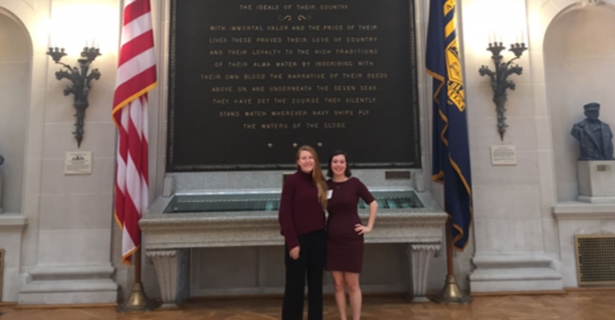The Naval Academy Leadership Conference 2018 on “Breaking Barriers: Obstacles Are Opportunities” brought in speakers including the Honorable Madeleine Albright, former U.S. Secretary of State; Sherri Brown, Senior Vice President of Humanitarian Services at the American Red Cross; LTG H.R. McMaster, National Security Advisor; and Gen James Conway, USMC (Ret.), 34thCommandant of the Marine Corps; along with cadets, civilians, and veterans from all-over the country to participate in this joint leadership exercise.
As an undergraduate and AFORTC cadet sitting in the audience, I was struck by how much importance and emphasis our military leaders placed on culture in their remarks. Culture eats strategy for lunch, said Ms. Michèle Flournoy, Former Under Secretary of Defense for Policy from 20019-2012.
The speakers also addressed challenges we will be facing as we enter the military:
• The values that permeate are the ones we build in training. They are being courageous, but not perfect. They are taking care of your team, but not being afraid to ask them for help. The hours reflect what you hope to accomplish, and what is it that should be prioritized. Training is also the best environment to foster independence and accountability within your flight or squadron.
• In one of our own Leadership Labs during ROTC training, we were encouraged to read A Message to Garcia. The man taking the Message to Garcia was only given, in the vaguest of senses, where Garcia was; never mind how and when he had to reach him by. However, we all are to emulate him—for he did the little things right. He brought the message to Garcia. He earned the right to be listened to and was never insecure in his command. As a Second Lieutenant, these traits are particularly important. You commission with Enlisted Officers under your command.
• The elisted officers under our command have earned the right to a competent, strong leader. However, we also have the most to learn from them—most are career military; most are incredible at what they do. As such, understanding what makes them perform at their best is your job.
I was so honored to be a small part of this larger discussion of how we build leaders for the future with its ever-changing obstacles on an ever-changing world stage.
The conference continued its discussion on leadership in other panels.
“Right now, 98% of you all in the audience are probably playing a finite game. You have no clue of what even is an infinite game. Well, let me tell you…”
Simon Sinek, author of the famous Start With Why and Leaders Eat Last, spoke to a rapt audience at the Naval Academy Conference in a gym full of generals, full-bird colonels, and 4,600 of Annapolis’ undergraduate cadets. Sinek was describing for the room a way to approach a mission in today’s terms. It had nothing to do with a strategy to combat the encroaching threats of Russia in a potential Syrian strike or China’s growing economic and military capabilities or ISIS’s virtual caliphate. It had everything to do with playing “the infinite game.”
Sinek defined five terms that generally describes when one is engaged in the infinite game: (1) You have a just cause. You know what you’re fighting for and not just what you’re fighting against; (2) You have courageous leadership that defines and sets the tone and expectations for their dynamic followership; (3) You have a vulnerable team that will ask for help and take ownership of their actions; (4) You have a worthy adversary; (5) You have an open playbook that will forever be in flex as your mission changes.
As a Tufts undergraduate hoping to graduate and commission into the United States Air Force as a Second Lieutenant, those words struck something deep. They were truly inspiring. But, they also felt slightly out-of-context for my life. I’ve come to embrace these mantras—in slightly, well, less classically “heroic” ways. You come to learn that everyone has a why they joined the military—every Second Lieutenant through Four-Star General. I hope to find myself on a Mobile Fluid Surgical Team (MFST), practicing austere medicine to stabilize soldiers so that they can return home.
It’s about holding steadfast to that belief that you have to put others higher than yourself. I know that I am still in my undergraduate years—I still have many more late nights with my coffee maker, many more early morning physical training sessions with my fellow cadets, and many more outdoor adventures with my TMC buddies. However, college is also the time to hone those leadership skills—practicing how to do the little things right.
I’ll never forget my just cause—my desire to serve others as a medic in the U.S. Air Force. I’ll never forget my courageous leadership—my cadre, my professors, my peers, and my family who have all supported me thus far. I’ll never forget that I am part of a vulnerable team—and I do need help every once in a while. Nor that I have past self as a worthy opponent to my present one. But, with an outlook that looks at education as enhancing my problem-solving and communication skills (no matter the subject) and an open playbook, I plan on enjoying and working hard towards my next goal of being on a Medevac Team upon graduation. The next step feels far more attainable when it’s put in the perspective of What am I doing right now that is engaging with my mission? which is, in my book, how I’m playing “the infinite game.”

